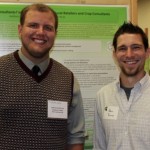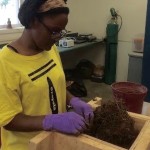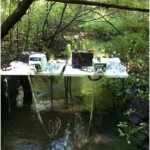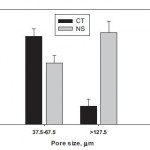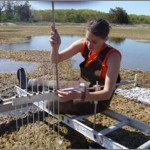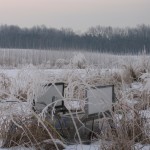KBS undergraduate summer researcher Julie Barrios is entering into the Marine Biology program at University of California, San Diego. She wrote about her Research Experience for Undergraduates experience working with Bonnie McGill, an LTER graduate student in Steve Hamilton's lab. Julie was funded by an NSF REU site award to the Kellogg Biological Station. ~~~~ This fall I will be transferring to the University of California San Diego to major in marine biology after being four years in community college. For a while I felt discouraged in my work and felt that I should have been done
Learning to be a scientist: Reflections from an undergraduate researcher
Jack of all trades: Reflections from an undergraduate researcher
KBS summer researcher Andrew Konieczny is majoring in Biology at Augsburg College in Minneapolis, Minnesota. He wrote about his Research Experience for Undergraduates project working with KBS LTER post doctoral researcher Adam Reimer in Phil Robertson's lab. Andrew was funded by an NSF REU site award to the Kellogg Biological Station. ~~~~~~~~ The summer of 2016 will forever hold a spot in my heart and will not be long forgotten in my mind. The plan was simple enough: go to Michigan, do some social science research, maybe meet some people, and return to life as normal. However, one of
My summer of science (fiction): Reflections from an undergraduate researcher
Each summer the KBS LTER supports students to participate in the Research Experiences for Undergraduates (REU) program, funded by the NSF. This is part of a larger undergraduate research program at KBS. Tori Niewohner is majoring in Environmental Science at Western Washington University. She wrote about her REU experience working with Kileigh Welshofer a graduate student in Dr. Pheobe Zarnetske's lab at MSU. ~~~~~ After my first day at the field site I would be working at for the summer, I attempted to describe it to someone. “Well, it’s a field of hexagonal structures
Clouds of confidence: Reflections from an undergraduate researcher
KBS summer undergraduate researcher Carlneshia Johnson is majoring in Biology at Alcorn State University. She wrote about her Research Experience for Undergraduates project working with KBS LTER PhD student Bonnie McGill in Steve Hamilton's lab. Carlneshia was funded by an NSF REU site award to the Kellogg Biological Station. ~~~ My experience at the Kellogg Biological Station in the Research Experience for Undergraduates program was one that is almost indescribable, but I will try my best to describe the wonderful experience I had at such an amazing place. How about you take away
Gaining a sense of oneness: Reflections from an undergraduate researcher
KBS summer undergraduate researcher Ivori Schley is majoring in laboratory animal science at North Carolina A&T. She wrote about her Research Experience for Undergraduates project working with KBS LTER & GLBRC Postdoctoral Research Associate Sarah Roley in Phil Robertson's lab. Ivori was funded by an NSF REU site award to the Kellogg Biological Station. ~~~~ Hello All! I am Ivori Schley, a rising sophomore from North Carolina Agricultural and Technical State University (North Carolina A&T). During this eventful summer in the Research Experience for Undergrads (REU)
Are streams pipes or processors of organic carbon from their watersheds? Reflections from an LTER fellow
Each year the KBS LTER program awards two graduate students with summer research fellowships. Here Sydney Ruhala describes the research her 2016 summer fellowship supported. Sydney is an M.S. student in Jay Zarnetske’s lab at Michigan State University. She recently was awarded best poster presentation in basic research at the 2016 Society for Freshwater Science meeting in Sacramento, CA – congrats, Sydney! ~~~~~~ As a graduate student in the Department of Earth and Environmental Sciences at Michigan State University, I have spent my summers wading through the rivers of southwestern
Mapping the soil aggregate highway: Reflections from an LTER fellow
Each year the KBS LTER program awards two graduate students with summer research fellowships. Here Michelle Quigley describes the research her 2015 summer fellowship supported. Michelle is a Ph.D. student in Sasha Kravchenko's lab at Michigan State University. When most people think of studying soils in agricultural systems, they picture someone out in a field taking soil samples or surveying crops or in a lab running samples. That is fairly typical for most soil scientists. However, while I do get out in the field, most of my time is spent staring at a computer screen. Carbon is
LTER Data Nuggets: Breathing new life into long-term data
Each year the KBS LTER program awards graduate students summer fellowships. Here Elizabeth Schultheis and Melissa Kjevik, now both postdoctoral researchers with Michigan State University, describe the project their summer fellowship supported. Today it is apparent that students and the public continue to struggle when faced with data and its interpretation. When asked to make sense of data taught in their science classrooms, gathered during classroom inquiry projects, or found in the news, students are unable to connect quantitative information to explanations of the
The ‘not so slow’ days of winter at the KBS LTER
By: Sarah L. Hanks, KBS LTER Outreach Team Many folks tend to think that winter is a time of rest and recuperation for farmers and agricultural researchers and professionals. The KBS LTER team would suggest that this could not be further from the truth. Just because there is snow falling and the ground is frozen does not mean that there is time to relax. After talking with Stacey VanderWulp, LTER Project Manager, and Kevin Kahmark, LTER Research Assistant, I found out just how busy things are around the KBS LTER during these cold months. Hundreds of plant samples are collected, by
New ways to measure nitrous oxide: reflections from a KBS LTER researcher
By, Dr. Ilya Gelfand, Research Associate, Kellogg Biological Station, Michgian igelfand@msu.edu When people ask me what I do, I need to stop for a moment to answer that for myself. What do I do? I have two types of answers: short and long. The short answer isn't very short either, since ecosystem ecology requires additional explanation. First, an ecosystem is defined as a community of living organisms living and interacting within their environment. Ecosystem ecologists need to study both living and nonliving parts and their interaction, or to study biogeochemistry: interactions between
- « Previous Page
- 1
- …
- 9
- 10
- 11
- 12
- 13
- …
- 17
- Next Page »

